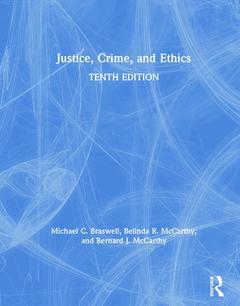Description
Justice, Crime, and Ethics (10th Ed.)
Authors: Braswell Michael C., McCarthy Belinda R., McCarthy Bernard J.
Language: English
Subject for Justice, Crime, and Ethics:
Keywords
Ethics; Professional values; Crime and society; Terrorism; Corporate misconduct; Juvenile justice; Criminal justice research; Crime policy; Prison; Corruption; Restorative justice; Community corrections; Parole; Probation; Corrections; Death penalty; Morality; Punishment; Sentencing; Prosecutorial misconduct; Courts; Misconduct; Training; Interrogation; Deception; Policing; Philosophy; Peacemaking; Justice; Crime
Approximative price 250.90 €
In Print (Delivery period: 14 days).
Add to cartPublication date: 11-2019
· Hardback
Approximative price 93.24 €
In Print (Delivery period: 14 days).
Add to cartPublication date: 11-2019
· 18.7x23.5 cm · Paperback
Description
/li>Contents
/li>Readership
/li>Biography
/li>
Justice, Crime, and Ethics, a leading textbook in criminal justice programs, examines ethical dilemmas pertaining to the administration of criminal justice and professional activities in the field. This tenth edition continues to deliver a broad scope of topics, focusing on law enforcement, legal practice, sentencing, corrections, research, crime control policy, and philosophical issues. The book?s robust coverage encompasses contentious issues such as capital punishment, prison corruption, and the use of deception in police interrogation.
The tenth edition includes new material in a number of chapters including "Learning Police Ethics," "Using Ethical Dilemmas in Training Police," "Prison Corruption," "Crime and Justice Myths," "Corporate Misconduct and Ethics," "Ethics and Criminal Justice Research," and "Ethical Issues in Confronting Terrorism." The use of "Case Studies," "Ethical Dilemmas," and "Policy and Ethics" boxes continues throughout the textbook. A new feature for this edition is the inclusion of "International Perspective" boxes in a number of relevant chapters.
Students of criminal justice, as well as instructors and professionals in the field, continue to rely on this thorough, dependable resource on ethical decision making in the criminal justice system.
SECTION I INTRODUCTION; 1. Ethics, Crime, and Justice: An Introductory Note to Students; 2. Utilitarian and Deontological Approaches to Criminal Justice Ethics; 3. Justice, Ethics, and Peacemaking; SECTION II ETHICAL ISSUES IN POLICING; 4. Learning Police Ethics: Sources Content, and Implications; 5. Using Ethical Dilemmas in Training Police; 6. Deception in Police Interrogations: Ethical Issues and Dilemmas; 7. Police Ethics, Legal Proselytism, and the Social Order: Paving the Path to Misconduct; SECTION III ETHICS AND THE COURTS; 8. Whatever Happened to Atticus Finch? Lawyers as Legal Advocates and Moral Agents; 9. Ethical Challenges for Prosecutors; 10. Balancing Harms: The Ethics and Purposes of Criminal Sentencing; 11. Punishment, Crime, and Ethics; 12. To Die or Not to Die: Morality, Ethics, and the Death Penalty; SECTION IV ETHICAL ISSUES IN CORRECTIONS; 13. Ethical Issues in Probation, Parole, and Community Corrections; 14. Restorative Justice and Ethics: Real-World Applications; 15. Prison Corruption; 16. Ethics and Prison: Selected Issues; SECTION V ETHICAL ISSUES IN CRIME CONTROL POLICY AND RESEARCH; 17. Crime and Justice Myths; 18. Juvenile Justice Ethical Issues: How Should We Treat Juveniles?; 19. Corporate Misconduct and Ethics; 20. Ethics and Criminal Justice Research; 21. Ethical issues in Confronting Terrorism; SECTION VI ETHICS AND THE FUTURE; 22. Criminal Justice: An Ethic for the Future
Dr. Michael C. Braswell is Professor Emeritus in the Department of Criminal Justice and Criminology at East Tennessee State University. He has degrees from Mercer University, the University of West Georgia, the University of Georgia, and his PhD from the University of Southern Mississippi.
Dr. Belinda R. McCarthy is Professor Emeritus of Counseling, Leadership, and Special Education at Missouri State University. Her PhD is in Criminal Justice from SUNY Albany.
Dr. Bernard J. McCarthy is Professor Emeritus of Criminology at Missouri State University. He is also Director of the Center for Community and Social Issues, and Program Coordinator for the MSAS (Criminal Justice and Homeland Security).

